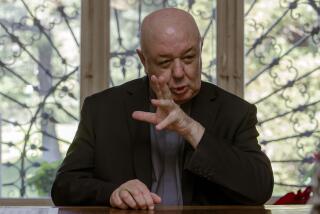Soviet Archives Yield Tidbits of History : Kremlin: Some Central Committee files are opened, but many of the choicest morsels remain out of bounds.
- Share via
MOSCOW — Neatly typed and stapled into buff or red folders, they were chronicles of affairs of state that were just too important or dangerous for the average Russian to know.
There was the 1980 Secretariat decision on the “impermissible” construction of drinking premises at state enterprises, for example.
For the record:
12:00 a.m. Feb. 27, 1992 For the Record
Los Angeles Times Thursday February 27, 1992 Home Edition Part A Page 3 Column 1 Metro Desk 2 inches; 39 words Type of Material: Correction
Soviet archives--Due to an editing error, a story in Wednesday’s Times misstated the initial access that will be granted to the archives of the defunct Soviet Communist Party Central Committee. Only a fraction of the collection’s 30 million documents are being made public now.
And one hot August day in 1986, Mikhail S. Gorbachev, the former Soviet president who then was Communist Party general secretary, alerted comrades in an “urgent” note that all means, including trucks belonging to the military, had to be thrown into the battle to save the Siberian harvest.
These documents, and many more, were brought into the harsh light of open exposure for the first time on Tuesday as one of the great repositories of secret information of the modern era, the archives of the defunct Soviet Communist Party Central Committee, was opened to the public. There are about 30 million pieces available to the public.
“Today, in essence, we can speak of the final step in fulfilling (Russian) President Boris N. Yeltsin’s order on transferring party archives to state control,” Rudolf G. Pikhoya, chairman of the Russian state committee on archives, proudly told a ceremony marking the opening of the archives.
Oil portraits of Karl Marx and V. I. Lenin gazed down on the audience that assembled in what will be the main reading room of the Center for the Preservation of Contemporary Documents, created four months ago to take custody of the Central Committee documents.
In cases around the hall, which used to be part of the sprawling Central Committee complex near Moscow’s Old Square, were displayed party artifacts that their authors could never have imagined would get beyond the Communist inner circle--such as the party card of dictator Josef Stalin, registration No. 0000002. (Even after his death in 1924, Lenin, the founder of the Soviet Union, was always issued card No. 1.)
But many of the choicest morsels, scholars and officials agreed, are still out of bounds and may remain so for the foreseeable future. The Central Committee archives were opened only in part and cover only the period of 1952 to 1991, omitting all but about 1 1/2 years of Stalin’s reign of terror and Lenin’s entire lifetime.
Other archives also exist in Moscow, including special KGB files and the “presidential archive” in the Kremlin, now under Yeltsin’s control. The Kremlin archive is the repository of all supersensitive documents issued by both Gorbachev’s presidential apparatus and the supreme party institution, the Politburo.
What will happen to these records of state is uncertain. Rem A. Usikov, the center’s director, said it would be a “blow at openness and research” not to remove them from the Kremlin for public scrutiny.
Records for party activities before 1952 are now in a separate Russian government facility on Pushkin Street.
Of the former Central Committee archive’s holdings, about 28 million are “review cards” evaluating activities and the character of party members and candidates.
Only a fraction of the archive’s other holdings are being made available to Russians and foreigners who wish to study them, Usikov said. Almost all of these documents are stamped “secret” or “top secret” and must be cleared by Russian authorities before being released, he said.
He added that discussions are underway with foreign scholars, including some at Stanford University, to use the papers to conduct joint investigations into “blank spots” of the Soviet past.
More to Read
Sign up for Essential California
The most important California stories and recommendations in your inbox every morning.
You may occasionally receive promotional content from the Los Angeles Times.













